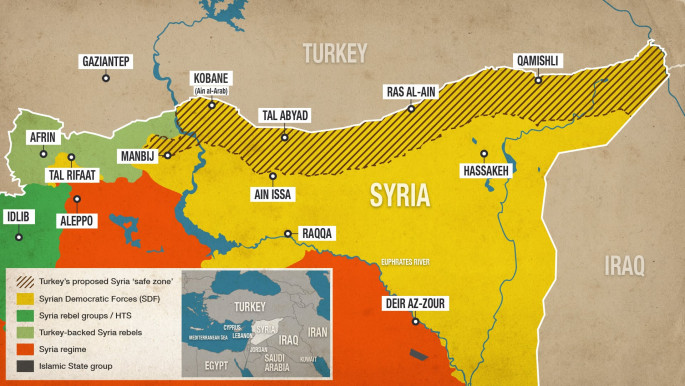HRW warns against mass transfer of IS suspects to Iraq amid deadly Turkish Syria assault
Human Rights Watch warned European countries on Tuesday against transferring foreign jihadist suspects from prisons in war-torn northeastern Syria to Iraq, after reports that hundreds of Islamic State group-affiliated family members escaped a camp in northern Syria.
The New York-based watchdog expressed concern that some countries with significant contingents of prisoners in Syria were seeking to move them across the border amid a controversial Turkish military operation in the country.
The Turkish offensive of areas controlled by Kurdish forces has sparked deep concern in Europe about the potential for mass breakouts by members of the Islamic State group.
According to the Kurdish administration in northeastern Syria, around 12,000 IS suspects are held in prisons across the area.
Around 2,500 of them are non-Iraqi foreigners.
Many European governments have been reluctant to repatriate these prisoners to stand trial and have already transferred some to Iraq to be prosecuted.
"Given Iraq's record of unfair trials, European states should not promote efforts to have their nationals transferred there for prosecution," HRW's Iraq researcher Belkis Wille said.
Any government supporting such a move "without taking measures to remove the risk of torture, sham trials and execution risks contributing to serious abuses", she said.
Wille said her organisation's monitoring showed that trials in Iraq were "inherently unfair and replete with due process violations".
She urged the UK, Denmark, France, Germany and other countries to seek their nationals' repatriation instead.
European officials have expressed fears that the US pullout decision and subsequent Turkish invasion could allow a resurgence of IS in the region and lead to more attacks in their own cities.
Meanwhile, hundreds of relatives of foreign fighters escaped from a displacement camp in northern Syria, Kurdish authorities said on Sunday, though Turkey has denied responsibility.
Just days later, the BBC reported three British orphaned children of Islamic State group militants who were discovered in Kurdish-run IS camp in Syria have been rescued by UN aid workers.
The children, Amira, 10, her sister, Hiba, eight, and their brother Hamza, had caught the attention of reporters after they spoke British English between themselves inside Ain Issa camp in Northern Syria.
The trio appeared to have come to Syria when their parents joined IS five years ago, before the group's territories were captured by US-backed Kurdish forces in north-east Syria, ending the self-declared "caliphate".
The three children were discovered by the BBC, according to a report on Monday, but went missing after Ain Issa came under attack by Turkish forces on Sunday, resulting in almost 800 IS wives and children escaping the camp.
The children were picked up by aid workers from the UN's refugee agency, Save the Children confirmed to The Daily Telegraph on Tuesday.
Read more: UN rescues British orphans trapped in IS camp in Syria
Their mother and father and three siblings had been killed by air strikes on the last IS territory, which fell to the Kurdish-led Syrian Democratic Forces in March.
The UK government has so far refused the return of IS militants and their families, despite pressure from the US-led coalition and their Kurdish allies.
On Monday, Washington announced that an order to withdraw nearly all of its troops from Syria was already being implemented, increasing fears that the move leaves the Kurdish forces it once backed in the lurch and abruptly dismantles Western military capabilities against IS in the area.
Follow us on Twitter: @The_NewArab





 Follow the Middle East's top stories in English at The New Arab on Google News
Follow the Middle East's top stories in English at The New Arab on Google News
![Netanyahu furiously denounced the ICC [Getty]](/sites/default/files/styles/image_330x185/public/2024-11/GettyImages-2169352575.jpg?h=199d8c1f&itok=-vRiruf5)
![Both Hamas and the Palestinian Authority welcomed the ICC arrest warrants [Getty]](/sites/default/files/styles/image_330x185/public/2024-11/GettyImages-2178351173.jpg?h=199d8c1f&itok=TV858iVg)
